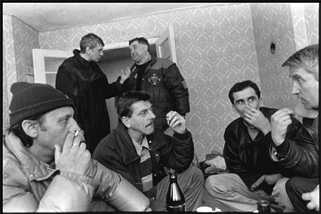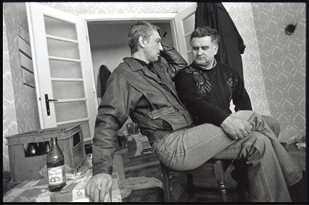|
|
|
 |
|
|
Vogosca had been under Bosnian control for about a week when, by chance, I met Zoran at an obscure pro-democracy meeting sponsored by IFOR and the United Nations in Ilidja. He told me that he had to go back to Vogosca to try to pick up things he had left behind, and asked if I would join him. After we arrived at his former home, a group of Muslim men showed up. They were like other such groups these days visiting the old neighborhood, most probably assessing the real estate. Suddenly it's all hugs and kisses -- they happened to know Zoran, and some were old friends. Zoran fetched the drinks, and stories started to pour out. The men spoke of the war's beginning when they would fight by day and meet to party at night, drinking and playing rami, a traditional card game. Now it was almost three years since they had seen each other, and they were trying to find out what had happened to former neighbors, especially who had died or been wounded.
|
 |
|
As the afternoon progressed, the warmth of forgotten affection between Zoran and his friends began to manifest itself even more. I experienced my own confusion of feelings: joy and tenderness at seeing them reunited, and anger at the absurdity of war in the face of such friendship. As the time to depart approached Zoran's closest friend, the one that he had been tenderly hugging all along, the one who mockingly beat him up, blaming their Slavic nature that causes them to "always end up fighting," was about to put on a beautiful hat. As I remarked on the hat, he told me that because of the cold and a head wound that he made me feel with my own hands, he had to wear a hat. He then turned around and pointed at Zoran, jokingly saying, "It's him! He threw the shell at me! It's his fault!" Zoran, then taking on a childlike voice and joining his hands as if in supplication, said, "So sorry." |
![]()